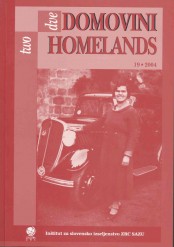Slovene Intellectuals – Emigrants In Croatia: The Case of Jernej Francelj (1821–1889)
Abstract
After 1848 and 1851, respectively, neoabsolutist policy began to inaugurate a vigorous policy of Germanization of the whole Habsburg Monarchy. The aim of the bureaucratic reforms was to form a single administration run by the German-speaking officials for the whole country. Along with the introduction of a unique, one-language state, Alexander Bach’s aim was also to suppress all national movements, particularly Slavic. Among German speaking officials whose task was to implement German language were also Slovene intellectuals, scholars and gymnasium professors, treated as “officials”, state bureaucrats. Due to their political affiliation, many of them could find a proper job only out of Slovene lands. The main destination, directed by the state authorities was Croatia, the then one of the constitutional parts of Hungarian part of the Habsburg Monarchy. One of those who has been given opportunity of employment there, was also Jernej Bartol(omej) Francelj, professor of History, Geography and Slavic languages, in police records noted as “Illyrist and Pan-Slavist”. Thus, he has finally – after lecturing at Rijeka and Zagreb Gymnaziums - permanently settled only in Varaždin, where he taught at the Varaždin Gymnazium. His great wish and aim was to educate not only the pupils but also Croatian farmers and craftsmen. For these reasons, he began to publish a populist paper Pueki prijatelj (Peoples’ Friend) in which he directed his attention mainly to general education of people, mainly the farmers; he also paid great attention to education of women. His great interest was to introduce a more intensive development of agriculture in Croatia. Although limited with the then political constellation in Croatia, his articles were not strictly apolitical; he has never denied his sympathies for Illyrians and Illyrian language, his sympathies for the national policy of the Czechs, and sympathies for Croatian national politicians versus Hungarian ones. Although he has been entirely bonded with the Croatian society, he has never denied his everlasting devotion to his homeland, Slovenia.
Downloads
Downloads
Published
How to Cite
Issue
Section
License

This work is licensed under a Creative Commons Attribution-NonCommercial-NoDerivatives 4.0 International License.
Authors guarantee that the work is their own original creation and does not infringe any statutory or common-law copyright or any proprietary right of any third party. In case of claims by third parties, authors commit their self to defend the interests of the publisher, and shall cover any potential costs.
More in: Submission chapter





